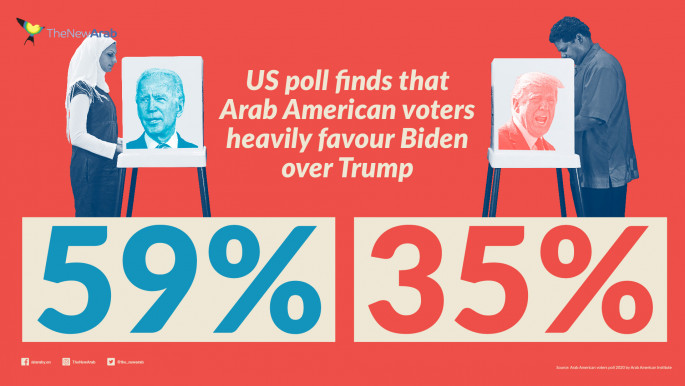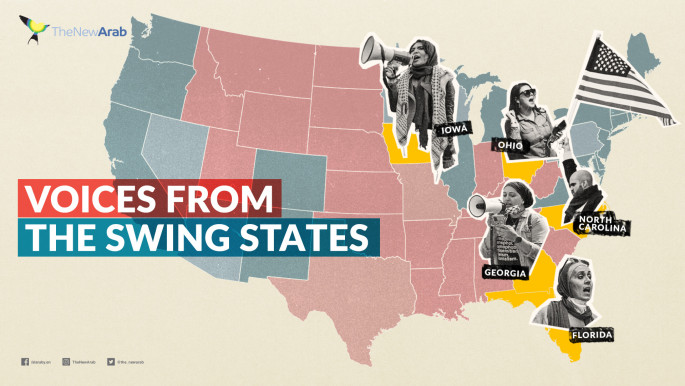
Here in Florida, this Iraqi refugee is about to vote in her first US election
But in 2010, I came to the US as a refugee with my husband. A decade later, I'm voting in my first presidential election where I know my voice will really matter.
I know the outcome will impact the immigrant and refugee community here in Florida, and that US foreign policy could and will affect many other other Arab countries, including Iraq. As a naturalised US citizen, I believe it's our responsibility to vote and protect our freedoms.
I encourage Arabs in the US like me to use their vote for two main reasons: First, because we're not just voting for our new home here, but also for those back in our home country. So many refugees and immigrants have family members they are still waiting for.
And second, this is not just a presidential election. There are many other local races and amendments on the ballot that we should pay attention to, because they will determine every single detail of our personal life, from our kids' school, to our health, to roads, homes and wages.
 |
In 2010, I came to the US as a refugee with my husband. A decade later, I'm voting in my first presidential election |  |
Ten years ago I had a different mindset because of the corruption I saw around me. Like many, I never believed in democracy or fair elections for Iraq. In Baghdad, dictatorship and war meant advocacy, freedom of speech, activism and even community organising were all forbidden in my life. The only place I would speak my mind was at home with my family, and even then, my mother would tell us to "stop talking politics because the walls have ears and the government always finds ways to hear us talking about them".
But coming to the US and seeking refuge here was a turning point. When my husband received a death threat, we came here as refugees and I left behind my career as an engineer with the Ministry of Oil within the Iraqi government.
 |
|
| Click to enlarge |
Since then, I have become a refugee advocate, educating the wider community about the refugee crisis and how US foreign policy has impacted my life and the lives of many other refugees. I am now the Florida refugee organiser for the We are all America national campaign, and recently co-founded my own organisation, WeaveTales to share and promote refugees' and immigrants' stories.
As a child in Iraq, I learned about America through two sources: One was Saddam Hussein's anti-America rhetoric, though I never believed him because in my mind he was hurting me much more than America was. But then there were times when I did believe him, because I would see the US Air Force dropping bombs on us, and killing innocent people.
The second source was my brothers, who were teenagers when I was born, and who always brought home bootleg American movies and concerts to watch, mocking Michael Jackson's dance steps and showing me through a small TV screen at home what America is.
I was not sure who or what to believe. Luckily, in their wisdom, my parents taught us to disconnect people from their governments. So when I arrived, I didn't know if I would find the America my brothers loved and taught me to love, or the one that invaded Iraq and caused the death and displacement of so many.
 |
Just when global need reached its highest, the Trump administration quickly reversed our nation's long history as a world leader in refugee protection and resettlement |  |
Surprisingly, I found both… a welcoming community, with so many great organisations who help and welcome refugees. But I also have also met people who believe the war against Iraq was important. I've faced some discrimination, but I've also seen people speaking their minds, and holding the government accountable through advocacy, protest and voting. This is what made me decide to engage; to make sure the road is paved for my daughters, and for many other refugees.
Twitter Post
|
People might think that immigration and refugee resettlement was an easy road for us, but that has never been so. Today, nearly 80 million people around the world are displaced from their homes, including 29.6 million who are designated refugees, and in need of a safe country to restart their lives. These are the largest numbers of vulnerable people in recorded history. Estimates indicate that a person is displaced from their home every 20 minutes.
Just when global need reached its highest, the Trump administration quickly reversed our nation's long history as a world leader in refugee protection and resettlement. The administration has decimated the US asylum system, and is now considering admitting only 15,000 refugees in the coming year - turning our backs on the values of compassion and welcome we claim to represent. This is unacceptable. We have a moral responsibility to welcome refugees at our doorstep and beyond.
Refugees like me who have escaped war, trauma and government corruption are bound to distrust the democratic process. But so much learning is happening, as we educate refugees in their new American communities about the process. Believing in our own voices takes time.
In Florida, naturalised citizens are more than 4 percent of the total number of registered voters. Of the more than 2.3 million naturalised citizens in Florida, more than a quarter are new citizens. Florida ranks first for states with new citizens from the Caribbean, and sixth for those from the Middle East and North Africa. Working with organisations like Florida Immigrant Coalition, we have been phone banking, texting, educating, registering voters, monitoring the polls to make sure there is no voter suppression, explaining mail-in ballots, encouraging early voting and now we are getting trained to be present in early voting locations to make sure our community votes safely.
Also, since 55 percent of newly naturalised citizens in Florida are women, we have been encouraging women to use their vote. As the famous poet Hafez Ibrahim once said, if mothers are well educated, that will reflect on the whole family. And so if mothers vote, everyone in the family will too. Because mothers have a valid reason to vote: our kids.
As a mother of two myself, I am voting to make sure my girls will grow up to be proud Muslim, Arab American women, daughters of refugees who feel welcome in their own home.
Basma Alawee is the Florida delegate for the Refugee Congress and a State Refugee Organiser with the Florida Immigrant Coalition.
Follow her on Twitter @BasmaAlawee
Have questions or comments? Email us at: editorial-english@alaraby.co.uk
Opinions expressed here are the author's own, and do not necessarily reflect those of her employer, or of The New Arab and its editorial board or staff.
Voices from the swing states: Click on our Special Contents tab to read more from Arab and Muslim Americans writing from the most heavily contested states this election.





 Follow the Middle East's top stories in English at The New Arab on Google News
Follow the Middle East's top stories in English at The New Arab on Google News


